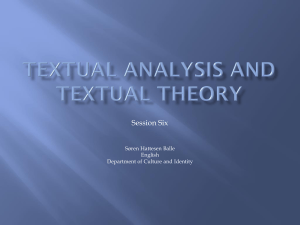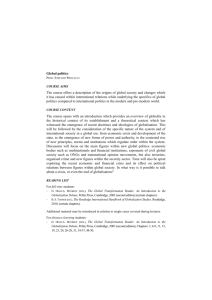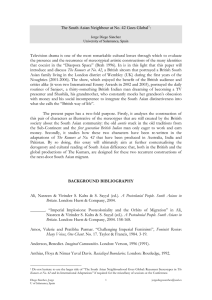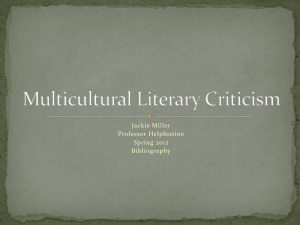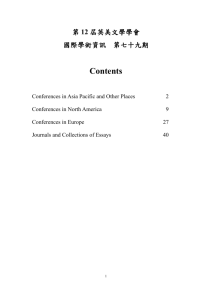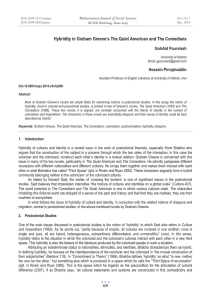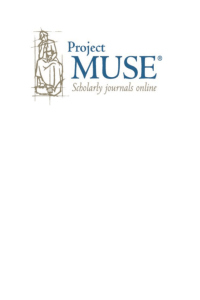Postcolonial Theories: Nation, Migration and Globalization Kate Liu
advertisement
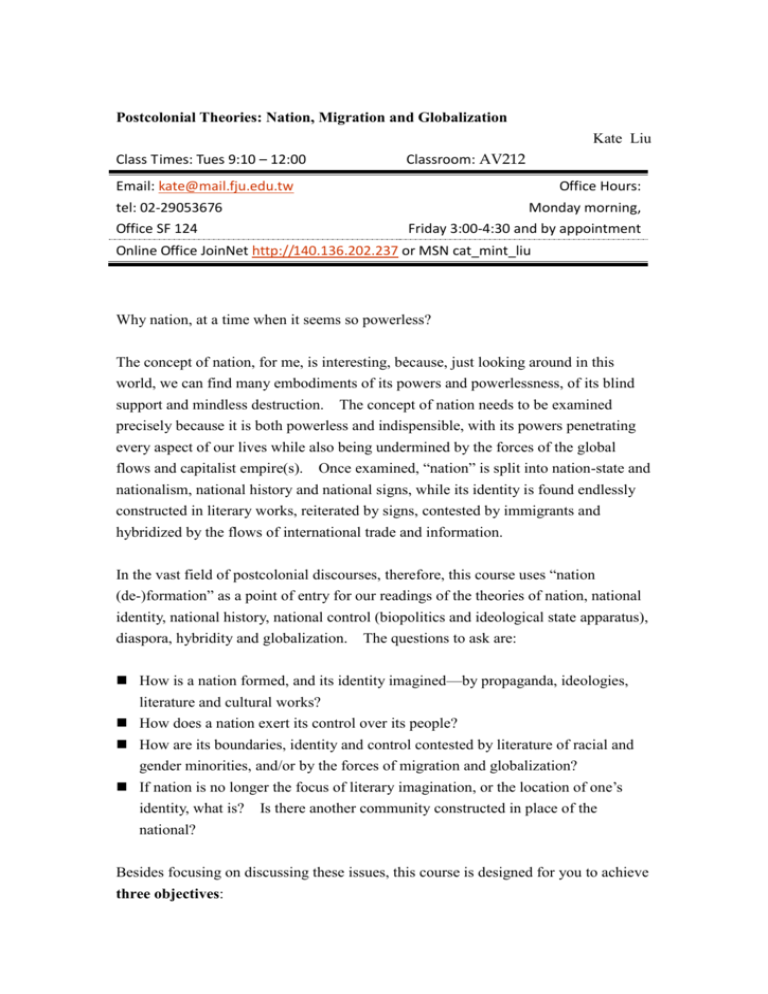
Postcolonial Theories: Nation, Migration and Globalization Kate Liu Class Times: Tues 9:10 – 12:00 Classroom: AV212 Email: kate@mail.fju.edu.tw tel: 02-29053676 Office SF 124 Office Hours: Monday morning, Friday 3:00-4:30 and by appointment Online Office JoinNet http://140.136.202.237 or MSN cat_mint_liu Why nation, at a time when it seems so powerless? The concept of nation, for me, is interesting, because, just looking around in this world, we can find many embodiments of its powers and powerlessness, of its blind support and mindless destruction. The concept of nation needs to be examined precisely because it is both powerless and indispensible, with its powers penetrating every aspect of our lives while also being undermined by the forces of the global flows and capitalist empire(s). Once examined, “nation” is split into nation-state and nationalism, national history and national signs, while its identity is found endlessly constructed in literary works, reiterated by signs, contested by immigrants and hybridized by the flows of international trade and information. In the vast field of postcolonial discourses, therefore, this course uses “nation (de-)formation” as a point of entry for our readings of the theories of nation, national identity, national history, national control (biopolitics and ideological state apparatus), diaspora, hybridity and globalization. The questions to ask are: How is a nation formed, and its identity imagined—by propaganda, ideologies, literature and cultural works? How does a nation exert its control over its people? How are its boundaries, identity and control contested by literature of racial and gender minorities, and/or by the forces of migration and globalization? If nation is no longer the focus of literary imagination, or the location of one’s identity, what is? Is there another community constructed in place of the national? Besides focusing on discussing these issues, this course is designed for you to achieve three objectives: 1) critical reading of both primary and secondary texts of modern and contemporary theories to understand the questions they ask and how they answer them, 2) engagement in some theoretical issues (such as meaning and interpretation, text and textuality, ethics and ideology, discourse, politics and power relations, etc.) as they arise from our reading of the primary texts, and 3) analyzing literary texts from different theoretical perspectives with an awareness of the limitations of each. Many literary texts can be chosen to help us concretize the theoretical issues. For instance, nation narration-文學—— 印/巴- Salman Rushdie The Midnight's Children; Shame 英- Victorian novels (e.g. Dickens, Eliot) Mrs. Dalloway Kazuo Ishiguru The Remains of the Day Graham Swift Waterland 平路〈台灣奇蹟〉;張大春〈將軍碑〉、〈四喜憂 國〉 李昂《迷園》; 林燿德《高砂百合》 national identity -- novels of American innocence 美 Gish Jen Typical American; Joan Didion Democracy;Bobbie Ann Mason In Country 日 三島由紀夫 "Patriotism" v.s. 大江健三郎 "The Day he himself Wipes my Tears Away" 台 侯孝賢《悲情城市》 nation and gender -- Sara Suleri’s Meatless Days, Margaret Atwood’s The Handmaid’s Tale; Bodily Harms, Timothy Findley The Wars diaspoa and city – Dionne Brand’s What We All Long For? Atom Egoyan The Adjuster, Calendar, Exotica, etc. National and Global culture – Salman Rushdie The Ground Beneath her Feet 流行音樂—— 豬頭皮、羅大佑、Bruce Springsteen, 龍的傳人 And the list can go on and on. Requirements: In this course, you will be responsible for: 1) active participation in class, 2) a 30-minute report on a theoretical text with an outline ready for online publication, 3) a 30-minute report on how a certain theory can be "critiqued" by, "used" on, or articulated with another literary or theoretical text. 4) a term paper of both theoretical discussion and literary application. Tentative Schedule Wk Date Examples 1 9/15. Introduction Laura Christman “Nationalism and Postcolonial Studies” 1 I. Theories of Nation and (Post)colonial Nations 2 9/22 Nation Formation: 1. a Historical Perspective Frantz Fanon “On National Culture” 2 Anderson, Benedict. Imagined Communities 3 3 9/29 2. National as a Political Form and Fictive Ethnicity Balibar, Etienne & Immanuel Wallenstein. "The Nation Form" 4 4 10/06 Nation Narration Brennan, Timothy. "The National Longing for Form." 44-70 Bhabha, Homi. "DissemiNation: Time, Narrative, and the Margins of the Modern Nation." 291-322. Third-World National Allegory F. Jameson “Third-World Literature in the Era of Multinational Capitalism” 5 A. Ahmad “Jameson’s Rhetoric of Otherness and the ‘National Allegory’” 5 Ref. M. Sprinker “The National Question: Said, Ahmad, Jameson” 6 5 10/13 6 10/20 II. Theories of Migration and Globalization 7 10/27 8 11/03 Global capitalism and biopolitics M. Foucault The Birth of Biopolitics (excerpt) 9 9 11/10 Hardt and Negri Empire Part 1 10 10 11/17 G. Deleuze & F. Guattari. Postcolonial nations: examples Globalization Defined Appadurai, Arjun. "Disjuncture and Difference in the Global Cultural Economy." 7 Tomlinson, John. Globalization and Culture. (excerpt) 8 Anti Oedipus: Capitalism and Schizophrenia 11 (excerpt) 11 11/24 Postcolonialism and Postcoloniality Graham Huggan Introduction. The Postcolonial Exotic 12 R. Frankenberg and Lata Mani “Crosscurrents, Crosstalk: Race, Postcoloniality and the Politics of Location.” 2 12 12/01 Migration and Hybridity A. Smith “Migrancy, Hybridity, and Postcolonial Literary Studies” 1 Friedman, Susan. “Beyond Difference: Migratory Feminism in the Borderlands” 13 13 12/08 14 12/15 15 12/22 Flows and Displacement Introduction from Displacement 14 Castells, Manuel. "An Introduction to the Information Age." 15 Transnational Feminism and Location Caren Kaplan. Introduction Between Woman and Nation. 16 ---. “Transporting the Subject: Technologies of Mobility and Location in an Era of Globalization” 17 Diaspora and Diasporization S. Hall “Cultural and Identity Diaspora” 18 A. Brah, “Refiguring the ‘Multi’: the politics of difference, commonality and universalism.” 19 Gayatri Gopinath. “Nostalgia, desire, diaspora: South Asian sexualities in motion” 17 16 12/29 Migration and Globalization: Examples 17 01/05 Paper Presentation 18 01/12 Paper Presentation Bibliography 1. Lazarus, Neil, ed. The Cambridge Companion to Postcolonial Literary Studies. New York, Cambridge UP, 2004. 2. Brydon, Diana. Postcolonialism: Critical Concepts in Literary and Cultural Studies. Vols.II & V. NY: Routledge, 2000. 3. Anderson, Benedict. Imagined Communities: Reflections on the Origin and Spread of Nationalism. rev. ed. NY: Verso, 1991 Chaps. 1-3 4. 5. 6. 7. 8. Balibar, Etienne & Immanuel Wallenstein. "The Nation Form" Race, Nation, Class: Ambiguous Identities. NY: Verso, 1991. Bhabha, Homi, ed. Nation and Narration. NY: Routledge, 1990. -- Brennan, Timothy. "The National Longing for Form." 44-70 -- Bhabha, Homi. "DissemiNation: Time, Narrative, and the Margins of the Modern Nation." 291-322. Sprinker, Michael. Appadurai, Arjun. "Disjuncture and Difference in the Global Cultural Economy." Modernity at Large: Cultural Dimensions of Globalization. Minneapolis: U of Minnesota P: 1996, 27-47. Tomlinson, John. Globalization and Culture. U of Chicago P: 1999. 9. Foucault, Michel. The Birth of Biopolitics: Lectures at the College de France, 1978-1979. Trans. Graham Burchell. Palgrave Macmillan, 2008. 10. Hardt, Michael and Antonio Negri. Empire. Harvard UP, 2000. 11. Deleuze, Gilles, and Guattari, Félix. Anti-Oedipus: Capitalism and schizophrenia. Trans. Robert Hurley, Mark Seem, and Helen R. Lane. New York: Viking, 1977. 12. Huggan, Graham The Postcolonial Exotic: Marketing the Margins. NY: Routledge, 2001. 13. Friedman, Susan Stanford. Mappings : Feminism and the Cultural Geographies of Encounter. Princeton, N.J Princeton UP, 1998. 14. Bammer, Angelika, ed. Displacements: Cultural Identities in Question. Bloomington and Indianapolis: Indiana UP, 1994.. 15. Castells, Manuel. "An Introduction to the Information Age." The Information Society Reader. Eds. Frank Webster, Raimo Blom, Erkki Karvonen, Harri Melin, Kaarle Nordenstreng, and Ensio Puoskari. London and New York: Routledge, 2004. 138-149. 16. Kaplan, Caren, Norma Alarcon and Minoo Moallem, eds. Between Woman and Nation: Nationalisms, Transnational Feminisms, and the State. Durham: Duke UP, 1999. 17. Ahmed, Sara, et al, eds. Uprootings/Regroundings: Questions of Home and Migration. 18. Braziel, Jana Evans, and Anita Mannur, eds. Theorizing Diaspora: A Reader. Oxford: Blackwell Publishing, 2003. 19. Brah, Avtar. “Refiguring the ‘Multi’: the politics of difference, commonality and universalism.” Cartographies of Diaspora Contesting Identities. NY: Routledge, 1996.


